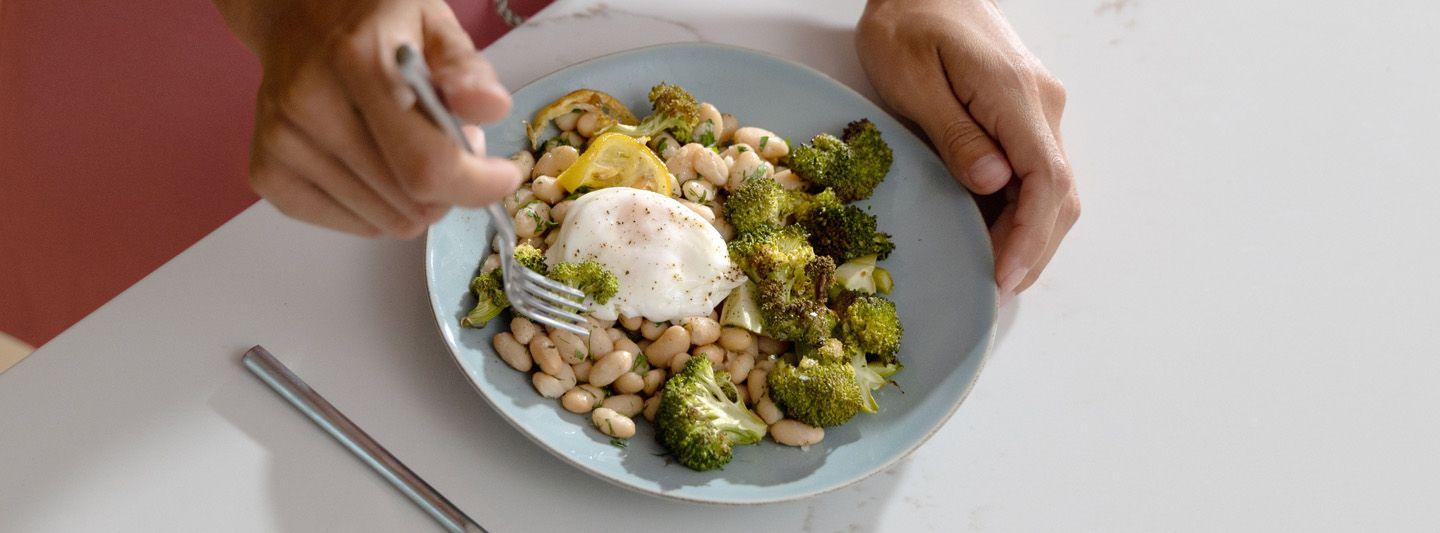How much protein should you eat in a day?
Current protein guidelines are to avoid deficiency and are too low for optimal health. Most people should be eating more protein.
April Benshosan,
Contributing Writer
Andrea Givens, MS, RD, CSSD,
Medical Affairs
Published:
February 27, 2025
Updated:
March 24, 2025
Read time:
4 minutes

The Reference Nutrient Intake (RNI) is set by the UK government and suggests eating 0.75 grams (g) of protein per kilogram (kg) of bodyweight each day. However, this is the minimum amount of protein needed to avoid deficiency.
To support optimal health and wellbeing, Lingo recommends eating about 1.5 g of protein per kg of desired bodyweight — roughly double the RNI.
Centring meals and snacks around high-protein foods, such as lean meats and poultry, eggs, seafood, dairy, soy, tofu, and beans can help you get more protein. While it’s best to get the majority of your protein from whole food sources, you can also include supplements like protein bars and powders to hit your daily intake.
Start Lingo today for just £59
Learn how your body responds to food and exercise with a 2-week plan*, no commitment.
Buy now
Protein is a macronutrient (aka “macro") essential for total-body health. While we often associate this nutrient with building muscle, protein is essential for regulating numerous physiological functions in the body such as supporting bone health and carrying oxygen in your blood. That’s why it’s so important to meet your protein goals every day.
Getting enough protein is especially important for active people, those wanting to improve their metabolic health, and everyone as we age. Protein intake is essential to build and maintain muscle mass, and increased dietary protein intake earlier in life may help mitigate muscle loss from ageing.
While the exact amount of protein you need per day depends on your age, weight, activity level, and other factors, there are some general protein guidelines that work for most adults to support optimal health and wellbeing.
Here, find out how much protein you need per day to stay healthy, and why the recommended daily amount is usually not enough.
Why do we need protein?
Proteins are molecules made up of amino acids that are essential for the human body’s structure and function. These amino acids help build DNA synthesis, muscle repair, bone support, muscle contractions, and cell signalling — all functions that keep us alive and healthy. 1
Protein also helps support our immunity. For example, antibodies are blood proteins that help us fight off infections. 2 The proteins keratin, collagen, and elastin help support our hair, skin, and nails. Most of the protein in our bodies is found in the muscles, skin, and blood. Eating protein foods supplies our body with the amino acids needed to carry out important functions and to support our health.
What is the recommended protein intake for adults?
Given all the vital health benefits of protein, it’s important to get enough of this macronutrient in the daily diet. Not only that, but protein also provides us with energy: each gram of protein contains 4 calories.
The recommended intake for protein depends on certain factors such as your weight, age, activity level, life stage (such as pregnancy), and other goals, like losing body fat and building muscle. The Reference Nutrient Intake (RNI), or daily recommended amount of protein set by the government, is 0.75 g of protein for every kg of bodyweight. With these guidelines, adult women need at least 45 g of protein per day while adult men need at minimum 56 g of protein each day. 3
However, it’s important to note that the RNI is the absolute minimum recommended amount of protein people should consume daily to support life functions and to prevent nutrient deficiencies.
In reality, the most up-to-date scientific evidence on dietary protein shows that daily protein intake should be much higher than the RNI for optimal health and wellbeing. 4 Medical and nutrition experts from Lingo recommend eating about 1.5 g of protein per kg of desired bodyweight.
If your goal weight is 68 kg, that means eating 102 g of protein each day. To reach this amount, aim for at least 30 g of protein at each meal and 15-30 g of protein with snacks.
To hit this protein target, a typical day of eating could look like (highlighting protein foods only):
Breakfast: Scramble with two whole eggs + 126 g liquid egg whites (26 g protein)
Snack: 57 g beef jerky (19 g protein)
Lunch: 114 g ground turkey (30 g protein)
Dinner: 114 g salmon (30 g protein)
Daily total: 105 g of protein
Is more protein better?
As mentioned, eating more protein than the RNI of 0.75 g per kilogram of bodyweight is recommended for most adults. Eating more protein can help you build and maintain lean muscle and aid in weight loss. Protein is the most satiating macronutrient compared to carbs and fats, and it helps curb cravings and keep you fuller for longer, partly by helping stabilise glucose levels. 5
You can get protein from both plant and animal sources. Some healthy protein-rich foods include red meat, poultry, dairy products, eggs, seafood, soy (including tofu and tempeh), beans and legumes, and nuts and seeds. Animal-based protein sources are particularly useful as they contain high amounts of the amino acid leucine, which acts as a metabolic switch to turn on muscle building.
You may have heard concerns over a high-protein diet causing kidney damage; however, recent research shows this to be untrue. 6 Ultimately, if you’re concerned about your protein intake and kidney health, it’s best to speak to a doctor.
It’s also important to note that 1.5 g of protein per kg of bodyweight is a general recommendation and not a substitute for medical advice. For personalised guidance, consult with a registered dietitian or other qualified healthcare professional.
What if I eat too little protein?
Protein deficiency is very rare, and most people generally don’t have trouble meeting the RNI for protein. However, some groups of people, such as older adults, people with disabilities, and those that over-restrict calories, are more at risk of a protein deficiency. 7
Not eating enough protein — i.e. less than the RNI of 0.75 g per kilogram of bodyweight — can result in health issues. If you regularly don’t eat enough protein, it could cause muscle loss, feeling weak, trouble thinking, a weakened immune system (getting sick often), brittle hair and nails, muscle weakness, and stress fractures. 8
A final note from Lingo
If your protein intake is somewhere around the government recommended minimum, while that may be enough to avoid deficiency, it's not optimal. If you find yourself hungry soon after you've eaten, have unsteady energy levels, or never seem to be making much progress in the gym, try aiming for 1.5 g/kg per day and see how you feel.
Consuming enough protein helps improve your body composition as it aids in building and maintaining lean muscle and supporting body fat loss by promoting satiety and curbing hunger. Protein also balances your glucose levels by slowing down the absorption of carbs and helping with appetite control and more stable energy levels. 9,10
Using a continuous glucose monitor (CGM) like Lingo can help you see how eating protein affects your glucose levels. You can use the personal data these devices provide to work out which foods might be best for keeping your glucose steady.
To get more protein in your day, try centring meals around high-protein foods such as lean meat, poultry, seafood, and tofu, and opt for snacks such as Greek yoghurt, edamame, nuts and seeds, and jerky.
The Lingo Glucose System is intended for users 18 years and older not on insulin. It is NOT intended for diagnosis of diseases, including diabetes.
The Lingo program does not guarantee that everyone will achieve the same results as individual responses may vary. Consult your healthcare professional before making changes to your diet or exercise regimen or if you have an eating disorder or a history of eating disorders.
© 2025 Abbott. All rights reserved. The biosensor shape and appearance, Lingo, and related brand marks are marks and/or designs of the Abbott group of companies in various territories. Other marks are the property of their respective owners.
ALB-02408
Published:
February 27, 2025
Updated:
March 24, 2025
Read time:
4 minutes


April Benshosan is a contributing lifestyle and wellness writer at Lingo. As an experienced writer, editor, and content strategist, she is deeply dedicated to responsible health journalism. She holds a master's degree in publishing, is a former Senior Food and Nutrition Editor at Livestrong, and has had work published in Women’s Health, EatingWell, Shape, Well+Good, and Verywell.


Andrea Givens, MS, RD, CSSD, is a Senior Medical Affairs Specialist and Health Coach at Lingo. Andrea has a passion for empowering individuals to leverage their unique physiology to optimize performance and health. She’s been a registered dietitian since 2010 and has been a board-certified specialist in sports dietetics since 2017. She holds master's degrees in both nutrition science and exercise physiology from San Diego State University.
More to explore on the blog

Add fiber to fill up and help manage your glucose
Eating fiber-rich foods can help keep your glucose steady throughout the day. Learn more about how to increase your fiber intake here.
April 28, 2025|2 minutes

Stuck in a food rut? Try something new
It’s easy to keep returning to the same familiar meals time and time again, but changing up your menu is great for your health. Learn more here.
April 28, 2025|2 minutes